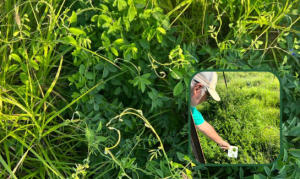Researchers aim to close the dry season feed gap for Northern Australian beef cattle farmers
Adding value to Northern Australia’s beef cattle industry greatly depends on an increase in the availability of high-quality, conserved forages. Fodder legumes, such as Lucerne, are not compatible with the neutral to alkaline clay soils and the seasonally dry environments of northern Australia.
James Cook University researchers Stanley Amben, Chris Gardiner and Glen Walker set out to investigate the ensilability of Progardes® Desmanthus and its potential to fill the feed gap.
The problem
- Northern Australia has annual dry season droughts and regular, more prolonged droughts.
- Common fodder legumes are not suitable for the semi-arid clay soils of this region.
The trial
- Five cultivars of Progardes®Desmanthus (JCU 2 D.virgatus, JCU 4 D.bicornutus, JCU 6 D.bicornutus, JCU 7 D.leptophyllus and JCU 9 D.pernambucanus) were grown and harvested for the trial.
- All harvested and chopped material was allowed to wilt to 30 to 40% moisture content prior to ensiling.
- The wilted material was then inoculated and packed firmly into purpose built silo tubes that were stored at 22°C for at least 60 days prior to being opened for sampling.
- The samples were compared to forage sorghum, Leucaena leucocephala Redlands, lucerne and maize silages.
The results
Progardes® silage demonstrated higher protein and metabolisable energy when compared to forage sorghum and equivalent levels to Lucerne. The suitability of Progardes® to be grown in the region makes it a promising conserved forage option for the Northern Australian beef cattle industry.
And what’s next for the trial?
Wet chemistry and further trails will be conducted to verify these initial results.
Want to know more? Read the paper presented at the Australian Agronomy Conference, 2022.
ABOVE: Initial trials show silage Progardes® is as good as Lucerne and a great option for the North



